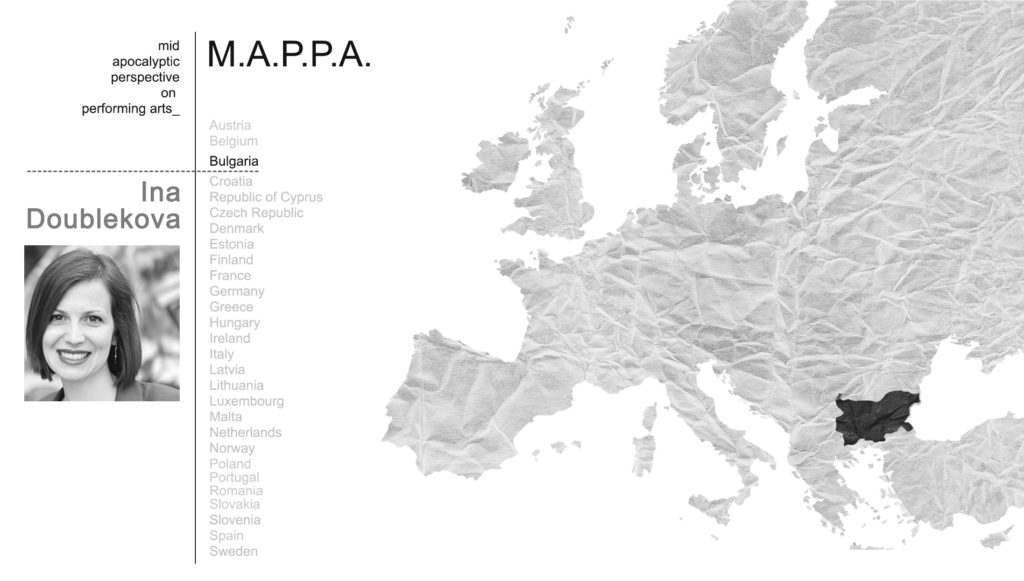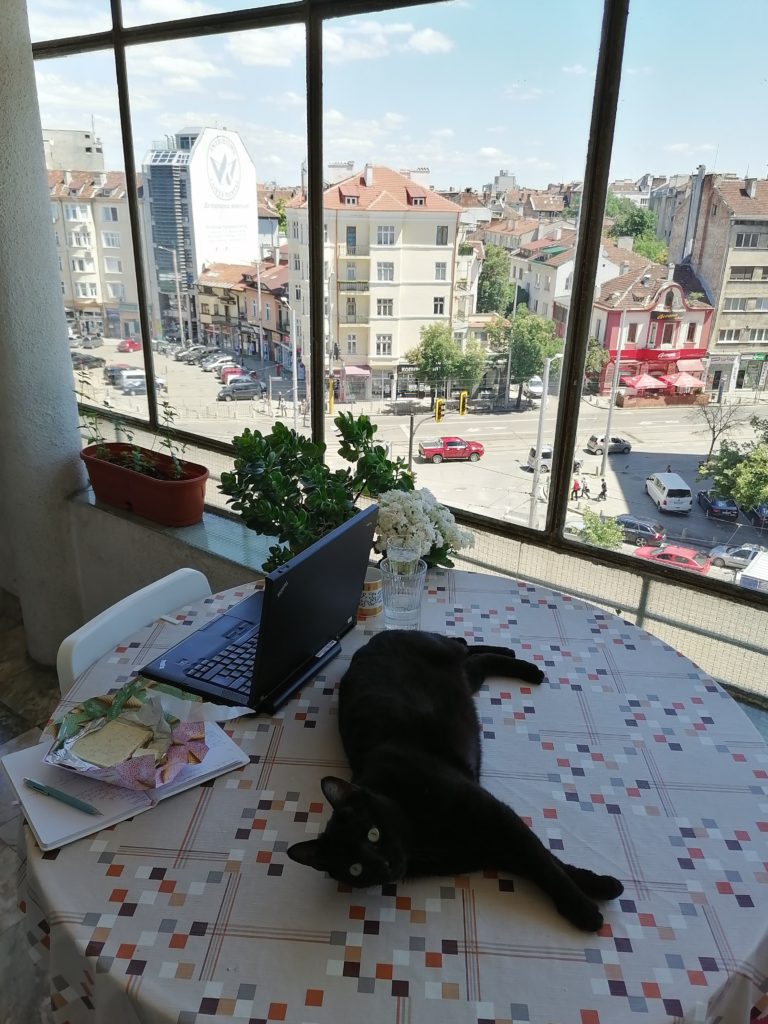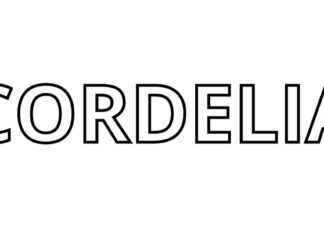 M.A.P.P.A. è un progetto di ricognizione e mappatura internazionale sulla critica dedicata alle performing arts. Abbiamo intervistato giovani giornalisti, osservatori e critici provenienti da tutta Europa.
M.A.P.P.A. è un progetto di ricognizione e mappatura internazionale sulla critica dedicata alle performing arts. Abbiamo intervistato giovani giornalisti, osservatori e critici provenienti da tutta Europa.
Leggi le altre interviste di M.A.P.P.A.
Ina Doublekova si forma in studi culturali e sociologia. Come co-fondatrice e direttrice della A25 Cultural Foundation – una ONG che lavora nel campo della cultura e delle arti contemporanee – è coinvolta in vari eventi e attività culturali, per lo più legati alla scena delle arti performative indipendenti. Dal 2017 fa parte del team di Antistatic Festival For Contemporary Dance and Performance. Allo stesso tempo, come giornalista e critica freelance, contribuisce a vari media e piattaforme nazionali e internazionali, dedicati alla cultura, alla società e alle arti dello spettacolo. È tra gli autori di Conflict Zones Review, la rivista online dell’Unione dei Teatri d’Europa, e di The Theatre Times
Quali misure sono state prese a sostegno dei lavoratori dello spettacolo in Bulgaria?
La situazione è in continuo sviluppo ed è difficile riassumerla brevemente, poiché ci sono molte sfumature che richiedono una spiegazione. Vale la pena ricordare che il sistema bulgaro delle arti dello spettacolo è costituito da tre segmenti principali in termini di finanziamento: i teatri statali, quelli comunali, e il vivace settore indipendente. Nei primi due casi i salari, benché sempre contenuti, sono garantiti dal bilancio del Ministero della Cultura o delle singole amministrazioni locali. In tal caso i lavoratori del teatro, impiegati con contratto a tempo indeterminato in quelle istituzioni, hanno continuato a ricevere i loro stipendi durante questi mesi turbolenti. Come è accaduto in molti paesi, la scena indipendente si è rivelata la più vulnerabile. Dopo alcune pressioni del settore e il chiaro messaggio inviato dall’UE che la cultura è tra i settori più colpiti e il suo sostegno dovrebbe essere una priorità, il Ministero della Cultura bulgaro ha raddoppiato il budget destinato alle organizzazioni indipendenti per il 2020. Contemporaneamente, diversi comuni hanno lanciato programmi di emergenza per artisti freelance e operatori culturali. Le misure finora annunciate o attuate sembrano guidate da due diversi tipi di logica: la prima è quella di offrire un’indennità alle persone che non hanno potuto esercitare la professione a causa del lock down. Sfortunatamente, la seconda, più frequente, è quello di aprire bandi per progetti, incoraggiando i candidati a creare contenuti online in tempi stretti. Tale requisito ha portato alla proliferazione di produzioni di bassa qualità. Inoltre, ci sono molte preoccupazioni su come questi fondi vengono distribuiti. Non è nemmeno chiaro come il drastico aumento del budget del Ministero della Cultura quest’anno influenzerà i suoi programmi per i progetti indipendenti negli anni a venire, in quanto non vi è alcuna chiara strategia e visione a medio e lungo termine dietro a queste azioni.
Quali sono le misure previste riguardo alle riaperture dei teatri?
I primi casi confermati di coronavirus sono stati registrati in Bulgaria l’8 marzo e tutte le attività indoor, comprese le manifestazioni culturali, sono state immediatamente vietate. Il 13 marzo nel Paese è stato dichiarato lo stato di emergenza, che è durato fino al 13 maggio ed è stato poi sostituito da uno stato di emergenza epidemica, prorogato a tutt’oggi. In quest’ultima fase è stata autorizzata la riapertura dei teatri che oggi possono svolgere spettacoli all’aperto e al coperto, seguendo determinate regole. Inizialmente per le attività indoor era consentito di utilizzare il 30% della loro capacità, poi dal 15 giugno tale limitazione è stata portata al 50%. Le mascherine sono obbligatorie negli spazi interni, al momento. Sono possibili anche le prove, quando vengano applicate tutte le regole di distanziamento sociale etc…
Il periodo del lockdown ha visto molti teatri e compagnie pubblicare su internet parte dei loro archivi. Molte sono anche le performance nate online, così come si parla sempre più di residenze digitali. Persino i festival, luoghi di incontro per eccellenza, stanno proponendo un cartellone digitale. Come ti relazioni a queste modalità di fruizione?
È una domanda complessa, che induce a dare un tipo di risposta giudicante, in bianco e nero. Il digitale è qui per restare e il suo ruolo si espanderà in futuro, quindi, piaccia o no, le forme d’arte dal vivo dovranno in qualche modo imparare a convivere con esso. Quello che mi piace di questa offerta digitale è la possibilità di dare un’occhiata a performance che altrimenti non si potrebbero vedere, poiché ogni produzione ha un certo ciclo di vita e cose eccitanti accadono in tutto il mondo anche se non si può essere ovunque, ovviamente. Quindi, come strumento educativo e di archiviazione, lo streaming di spettacoli è utile. Tuttavia, dovremmo sempre tenere a mente che questo è solo un assaggio e non l’esperienza vera e propria della sala. In questo senso mi sembra che ci siano anche molte “fake news” in queste performance in streaming, il che significa che parte del nostro lavoro di critici (e di tutti gli altri professionisti del teatro) è ora diventato quello di partecipare al processo di sviluppo delle capacità di visione, e, fruendo delle performance digitali insieme al pubblico, contestualizzarle in modo appropriato. In generale, la pressione di dover andare “in scena” online, che molti artisti hanno sperimentato durante il blocco, è fastidiosa. Non dobbiamo mai dimenticare che una registrazione di buona qualità richiede risorse quasi uguali a quelle necessarie per la produzione stessa. In questo senso, almeno fino allo scoppio della pandemia, l’archivio digitale è stato un privilegio delle realtà più grandi e consolidate, con finanziamenti stabili. Ad esempio, per il National Theatre di Londra o la Filarmonica di Berlino, il passaggio è stato facile perché da anni è parte del loro modello di business. Questa è una discrepanza che deve essere affrontata nel nostro nuovo presente.
Quali sono state le pratiche performative più interessanti durante i giorni del lockdown dal tuo punto di vista?
Ad essere onesti, mi sembra che il lockdown in sé ci abbia donato diverse esperienze performative molto potenti, paradossalmente alternative ed allo stesso tempo mainstream. Non so come sia successo, o come mi sarei sentita dal vivo, ma i video girati in Italia delle persone che cantano sui balconi, che i social hanno diffuso ovunque, sono stati sbalorditivi e hanno innescato un senso di umanità e di solidarietà di fronte a ciò che ci trascende, simile a quello che le migliori esperienze teatrali portano. Lo stesso vale per Andrea Bocelli che esegue Amazing Grace nella piazza deserta di fronte al Duomo di Milano, oppure la prima protesta durante il lockdown che abbiamo visto a metà aprile in Israele, con le persone a 2 metri di distanza l’una dall’altra, o le migliaia di manifestanti sdraiati a faccia in giù per 8’46’’ sul ponte Portland Burnside, in Minnesota.
Credi che questa crisi cambierà profondamente i linguaggi, gli spazi, i temi delle arti performative?
In un’intervista per The Art Newspaper rilasciata durante il blocco, a una domanda simile sul linguaggio e il posizionamento sociale della performance art, Marina Abramovic afferma: “penso che la realtà aumentata potrebbe essere una soluzione perché puoi catturare l’energia e averla in soggiorno, tutta e sola per te.” Tenendo in mente questa visione, credo che certi cambiamenti avranno luogo: l’isolamento diventerà sicuramente l’argomento di molte nuove produzioni, routine come la disinfezione, il mantimento delle distanze o l’uso delle mascherine potrebbero diventare gestualità innate, le telecamere e la multimedialialità saranno sempre più ricorrenti, le performance saranno pensate dal punto di vista di una telecamera mentale, spettatori e attori non saranno necessariamente presenti nello stesso spazio fisico. Ma questi potrebbero rivelarsi tutti cosmetici, come un aggiornamento necessario del sistema. Tuttavia, il nucleo profondo dell’esperienza performativa, invisibile e tuttavia denso e costruttivo, resterà tale.
È possibile vivere del mestiere della critica in Bulgaria?
Non proprio. Bisogna sempre combinare attività diverse – e spetta a noi scegliere se saranno tutte nel campo delle arti, della cultura e del mondo accademico o se sarà qualcosa di completamente diverso, solo per pagare le bollette. La crisi corrente non ha nemmeno esacerbato più di tanto la situazione, tuttavia ciò che è mutato è il panorama dei media, poiché molte delle piattaforme culturali indipendenti, ancora interessate a pubblicare recensioni, sono allo stremo. Anche molti festival ed eventi per i quali una critica può lavorare versano in situazioni precarie.
Che cosa ti manca di più della dimensione live delle arti performative?
A livello soggettivo mi manca il rito personale di prepararsi a uscire mentre ci si chiede in silenzio se ci godremo o meno la performance, cercando di prevedere come sarà. Come spettatore mi manca immensamente il pericolo, il senso di rischio che si percuote ogni performance, la sensazione che sebbene le produzioni siano così agili, dopotutto sono sempre strutture molto fragili, che possono rompersi da un momento all’altro se un solo attore dimentica una battuta o gradini su un lato. Tutto ciò manca completamente quando si vede una registrazione, anche solo perché è possibile controllare la durata di una performance, capire quanto manca alla fine. Mi manca molto anche la libertà di scegliere chi e cosa guardare sul palco, senza la mediazione e il processo decisionale della telecamera.

Ina Doublekova has a background in Cultural Studies and Sociology. As a co-founder and director of the A25 Cultural Foundation– an NGO, working in the field of contemporary culture, arts and society – she is involved in various cultural events and activities, most often related to the independent performing arts scene. Since 2017 she is part of the team of Antistatic Festival For Contemporary Dance and Performance. Simultaneously, as a freelance journalist and critique, she contributes to various national and international media and platforms, dedicated to culture, society and performing arts. She is among the authors of Conflict Zones Review, the online magazine of the Union of European Theaters, and The Theatre Times
What are the measures overtaken by the national government, or by the local institutions, in support of the theatre workers?
The situation is constantly developing and it is hard to summarize it briefly, as there are many important nuances that need detailed explanation. As background information it is probably worth mentioning that the Bulgarian performing arts system consists of three major segments in terms of its funding: the state-run theaters, the municipality-run ones and the vivid independent sector. The wages in the first two types of institutions vary and are generally not high but are secured by the budget either of the Ministry of Culture or the municipalities of each city, so the theatre workers, employed on permanent contracts in those institutions at least continue receiving their salaries during these turbulent months. As it happened in many countries, the independent scene and the professionals working in it turned out to be most vulnerable in the crisis. After some internal pressure from the sector and the clear message sent on EU level that culture is among the hardest hit sectors and its support should be a priority, the Bulgarian Ministry of Culture announced several support schemes. Thus, its budget for 2020 was increased twice with an unseen amount of money by the government, targeted towards the independent organizations. Simultaneously, several municipalities also launched emergency programs for freelance artists and cultural operators. The measures announced or implemented so far seem to be structured and driven by two different types of logic: first one being to offer stipends to people who could not practice their profession due to the situation for 3 months. Unfortunately, the second one, which is most often applied, is to open calls for independent projects, encouraging the applicants to create an online content within months. Such a requirement is very artificial and led to the proliferation of low-quality production. Furthermore, there are many concerns about how those funds are distributed. It is also not clear how the drastic increase of the budget of Ministry of Culture this year will/might affect its programs for independent projects in the years to come, as there isn’t any clear mid and long-turn strategy and vision behind those actions.
What is the perspective about the reopening of theatres, both for plays and rehearsals?
The first confirmed cases of coronavirus were registered in Bulgaria on March the 8th and all indoor activities, including cultural events, were immediately prohibited. On March 13th, a state of emergency was declared in the country, which lasted untill May 13th and was then replaced by a state of epidemic emergency. In the latter phase, theaters were allowed to reopen and today they can carry out outdoor and indoor performances, following certain rules. Initially for the indoor activities they were allowed to use 30% of their capacity and since the June 15th this restriction is raised to 50 %. Face masks indoor are mandatory at the moment. Rehearsals are also possible, when social distancing and other rules are followed.
During the lockdown many theatres and companies published part of their archives on the Internet. Also, we have been watching many digital performances, as well as there has been an intensive talking about “digital residences”. Even the festivals, that can be seen as the most evident meeting places, are proposing a digital billboard. How do you relate to this way of enjoying the performing arts?
It is a difficult and multilayered question, which tempts into giving a judgmental, black-and-white type of answer. The digital is here to stay and its role will expand in future, so like it or not, live art forms will have to somehow learn to coexist with it in a balanced way. What I like about this digital offering is the possibility to get a glimpse of performances that one might not be able to see otherwise, as each production has a lifespan and exciting things happen all over the world and one cannot be everywhere, of course. So as an educational and archive tool, streaming of performances is useful. However, we should always keep in mind that this is just a glimpse and not the full-blooded actual experience in the hall. In that sense it seems to me that there is also a lot of “fake news” in this digital performance streaming, which means that part of our job as critiques (and of all other theater-professionals) has now become to participate in the process of developing new skills of seeing and watching digital performances among our audiences, contextualize them in a proper way. Thus, the “peer pressure” of having to go online that many artists experienced during the lockdown and the aftershock of it, is troublesome. In Bulgaria it was exacerbated by public funding bodies, which offered support in exchange for home-made online projects. And we should never forget that the satisfactory quality of a recording of a performance requires resources almost equal to the ones needed for creating the production itself. In that sense, until the outbreak of the pandemic at least, it was a privilege mainly of the bigger, established companies with stable funding. For example, for the English National Theater or The Berlin Philharmonic the switch was easy because this is part of their business model for years now. So this discrepancy needs to be addressed in our new present.
The most interesting alternative theatrical practices you have experienced in these days.
To be honest, it seems to me that the lockdown gave us several very powerful, paradoxically alternative but mainstream at the same time performative experiences. I do not know how it happened and felt live but the videos of the balcony singing in Italy that social media brought one morning were stunning and triggering this breathless sense of “us, humanity” holding tight together in the face of what is transcendental and beyond, which the best theatrical experiences bring about. Same goes in a way for Andrea Bocelli performing Amazing Grace on the empty square in front of the Milano Cathedral, the first protest during the lockdown we saw in mid-April in Israel, when people were standing 2 meters apart or the thousands of protesters laying face-down on the Portland Burnside Bridge in Minnesota for 08:46 minutes.
Do you think that this crisis will profoundly change the languages, spaces, themes of the performing arts, also with regard to the co-presence of actors or performers and the audience in the same space-time?
In an interview for The Art Newspaper given during the lockdown, to a similar question about the language and social position of performance art, Marina Abramovic claims: “In the meantime I think augmented reality could be a solution because you can capture the performer’s energy and have it in your living room, all just for you.” Having this vision in mind, for the time being my intuition is that changes will take place – lockdown and isolation will definitely become a major topic of many new productions, routine actions like disinfecting, keeping a distance or putting a facemask might become largely used Gestus, cameras and multimedia will become more often used as tools, performances will be created with a camera view in mind as well and viewers and actors will not necessarily be present in the same physical space – but they all might turn out to be cosmetic, like an necessary update of the system. Yet, the in-depth core of invisible but very concentrated and uplifting experiences for audience and artists will be preserved.
Is it possible to make a life out of theatre criticism in Bulgaria? Is there any particular trouble due to the current crisis for the critics?
Not really. You always have to combine different activities and it is up to you to choose whether all of them are going to be in the field of arts, culture and academia or you will do something totally different aside to pay your bills, so this part has not been exacerbated by the situation as it was just as bad before it. However, what has changed is on the one hand is the media landscape as many of the independent cultural platforms, which are still interested into publishing reviews, are on the verge, thus many of the festivals and the events for which a critique can work are also in a difficult and unstable situation.
What do you miss the most from live performances and plays?
On a subjective level I miss the personal ritual of having to prepare, to go out, while silently wondering all the time whether you will enjoy the performance or not, trying to foresee what it will be like. As a viewer I immensely miss the danger, the sense of risk tictacking in each performance, the feeling that though the productions are so agile, after all they are always very fragile structures, that can break any minute if just one actor forgets a line or steps on one side. This is completely missing when you see a recorded version of it because on the screen you can check the duration from the moving marker at the bottom and you know that it got to the end. And I also miss a lot the freedom to choose whom and what to watch on the stage, without the mediation and the decision-making of the camera on my behalf.












